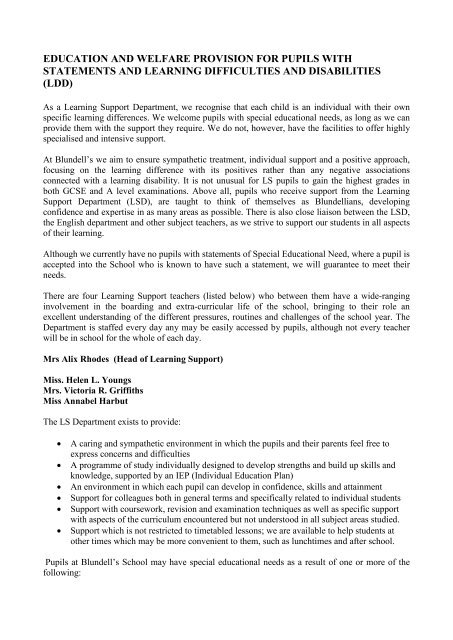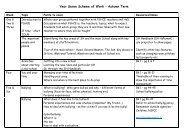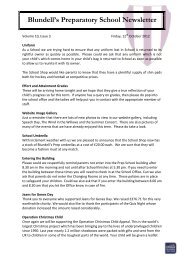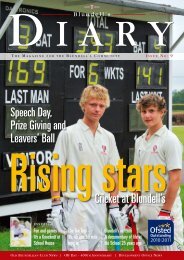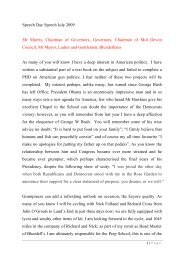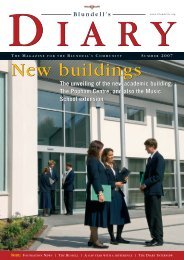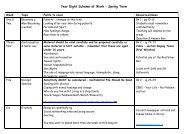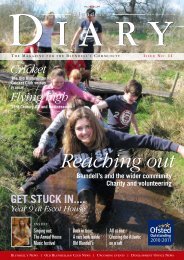Learning Support - Blundell's School
Learning Support - Blundell's School
Learning Support - Blundell's School
- No tags were found...
Create successful ePaper yourself
Turn your PDF publications into a flip-book with our unique Google optimized e-Paper software.
EDUCATION AND WELFARE PROVISION FOR PUPILS WITHSTATEMENTS AND LEARNING DIFFICULTIES AND DISABILITIES(LDD)As a <strong>Learning</strong> <strong>Support</strong> Department, we recognise that each child is an individual with their ownspecific learning differences. We welcome pupils with special educational needs, as long as we canprovide them with the support they require. We do not, however, have the facilities to offer highlyspecialised and intensive support.At Blundell’s we aim to ensure sympathetic treatment, individual support and a positive approach,focusing on the learning difference with its positives rather than any negative associationsconnected with a learning disability. It is not unusual for LS pupils to gain the highest grades inboth GCSE and A level examinations. Above all, pupils who receive support from the <strong>Learning</strong><strong>Support</strong> Department (LSD), are taught to think of themselves as Blundellians, developingconfidence and expertise in as many areas as possible. There is also close liaison between the LSD,the English department and other subject teachers, as we strive to support our students in all aspectsof their learning.Although we currently have no pupils with statements of Special Educational Need, where a pupil isaccepted into the <strong>School</strong> who is known to have such a statement, we will guarantee to meet theirneeds.There are four <strong>Learning</strong> <strong>Support</strong> teachers (listed below) who between them have a wide-ranginginvolvement in the boarding and extra-curricular life of the school, bringing to their role anexcellent understanding of the different pressures, routines and challenges of the school year. TheDepartment is staffed every day any may be easily accessed by pupils, although not every teacherwill be in school for the whole of each day.Mrs Alix Rhodes (Head of <strong>Learning</strong> <strong>Support</strong>)Miss. Helen L. YoungsMrs. Victoria R. GriffithsMiss Annabel HarbutThe LS Department exists to provide:• A caring and sympathetic environment in which the pupils and their parents feel free toexpress concerns and difficulties• A programme of study individually designed to develop strengths and build up skills andknowledge, supported by an IEP (Individual Education Plan)• An environment in which each pupil can develop in confidence, skills and attainment• <strong>Support</strong> for colleagues both in general terms and specifically related to individual students• <strong>Support</strong> with coursework, revision and examination techniques as well as specific supportwith aspects of the curriculum encountered but not understood in all subject areas studied.• <strong>Support</strong> which is not restricted to timetabled lessons; we are available to help students atother times which may be more convenient to them, such as lunchtimes and after school.Pupils at Blundell’s <strong>School</strong> may have special educational needs as a result of one or more of thefollowing:
• General learning difficulties• Specific learning differences• Particular difficulties with literacy/numeracy/other skills• Emotional, social or behavioural problems• A physical disability• Speech or language difficulties• A medical or health problemThe Department for Education and Employment’s Code of Practice on the identification andassessment of Special Educational Needs and the Disability Discrimination Act 1995 (part 4) asamended by SEN and Disability Act 2001 is very much taken into account when consideringassessment and provision for children who seem to have special needs. Each pupil with a specialeducational need requires special consideration and treatment. If appropriate, adjustments will needto be put in place. We will discuss thoroughly with parents the adjustments that can reasonably bemade for their child once they have accepted the offer of a place and before s/he becomes a pupil atthe school.Identifying those who need <strong>Learning</strong> <strong>Support</strong>For those students entering Blundell’s Senior <strong>School</strong> from the Preparatory <strong>School</strong>, there is acontinuity of <strong>Learning</strong> <strong>Support</strong> between the Departments. Parents will be contacted by letter askingthem if they would like their child to be seen in <strong>Learning</strong> <strong>Support</strong>.For those pupils joining us from other schools, every effort is made to continue learning support byliaising with parents and the <strong>Learning</strong> <strong>Support</strong> Departments of their previous schools. We rely onparents providing full, clear and transparent information about the levels of support their childrenhave been receiving, and opening the dialogue with us before arrival so that suitable humanresourcing can be put in place before arrival. Where this information has not been provided (butemerges later on in the pupil’s time here), we do our very best to provide appropriate support, butwe recommend good communication from the start so that the pupil receives the best possiblecontinuity and educational provision.Students who enter the Senior <strong>School</strong> from another school without parental notification ofpreviously diagnosed learning difficulty or disability will often be identified by colleagues throughone of the processes below; these often highlight patterns or results where there may be areas ofconcern for further investigation:• Entrance examination scripts (particularly English)• NFER Vocabulary and Comprehension tests in Year 7 and Year 9• MidYIS tests in Year 7 and Year 9• English Department colleagues based on written work assessment• Subject teachers during Common Room Mark Order Meetings• Deputy Head, Academic, House parents or tutors, when comparing current attainment ininternal examinations or routine work to MidYIS potentialThis concern is registered by the Head of <strong>Learning</strong> <strong>Support</strong> and opinions sought from othermembers of the Common Room involved with the pupil. Parents are informed, and brought in to thediscussion. Depending on the individual circumstances, the situation is then monitored or, withparental consent, initial assessments are begun.
An informal assessment will then be made of both the difficulties and suggestions for remediation.At this point, parents will be sent a short report and support provision, if necessary, will be offered.For pupils in Years 10 or above, if the difficulty could qualify the student for special accessarrangements in examinations, or if the results do not produce a clear picture of the difficulty andhence way forward, an Educational Psychologist’s assessment may be recommended to the parentsand we can assist with all the arrangements to do this, and to disseminate and discuss the results.Consent to provide <strong>Learning</strong> <strong>Support</strong>Consent forms, detailing the fees payable termly, are sent out at the start of the academic year toparents whose children are not already receiving <strong>Learning</strong> <strong>Support</strong> at Blundell’s. They areaccompanied by a personal letter offering a recommendation as to the frequency of support, aparental questionnaire, and information about the <strong>Learning</strong> <strong>Support</strong> Department. These forms allowparents to decline the support if they so wish.If replies are not received within four weeks, a follow-up letter will be sent, and House parentsinformed. If there is still no response, parents will be contacted by telephone before the end of thefirst half of term. Students who have received support in the previous year and who have arrivedfor support sessions will be seen in the meanwhile.Although assessments and IEPs will indicate the most appropriate level of support, parents canrequest to vary this, where there is availability of time and staffing. This can be increased infrequency above the recommendation or they may choose to reduce the support.Access Arrangements in Public Examination sittingsIn public examination, access arrangements are additional provisions or circumstances permittedduring coursework assessment and terminal examinations. They are applied to those pupils whosespecial educational needs have implications for the way they need to be assessed. The purpose ofaccess arrangements is to provide pupils with opportunities to demonstrate their attainment; theymust be designed and applied to enable pupils to fulfil assessment criteria needsExamination at GCSE or above leads to formal qualifications used for entry to further study,training and employment. They are conducted by external examining bodies. The examinationconditions under which pupils are required to demonstrate knowledge and skills are specified in anexamination syllabus and any adaptations or modifications are at the discretion of the examiningbody. The examining body needs to know a pupil’s assessment needs before permission may begiven to apply a special arrangement. The <strong>Learning</strong> <strong>Support</strong> Department, in conjunction with the<strong>School</strong> Examination Officer, prepares and presents to the examining body the evidence which candemonstrate a pupil’s learning difficulty and related assessment needs. A statement of SpecialEducational Need or an Educational Psychologist’s report does not in itself guarantee the provisionof special arrangements.Pupils who may need special arrangements in examination must also be on the <strong>Learning</strong> <strong>Support</strong>Register at <strong>School</strong> Action Plus. This means that they must be obtaining support either from theschool or from a recognised external agency. Generally an IEP will be in place and this will formthe evidence for support.
Examples of access arrangements:• Extra time allowances• Use of rest periods• Use of reader/scribe/amanuensis• Use of additional evidence for example, transcripts• Use of mechanical or technological aids such as a work processor• Alternative accommodation arrangements in invigilation procedures for example within theschool or in a hospital• Use of modified forms of communications e.g. yellow examination papersThe list is not exhaustive, and other arrangements may be deemed necessary, but approval willalways be required from the examining body.Additional charges may be applied especially where an external invigilator has been employed.These charges may be absorbed by the school where a child is in receipt of support at the “fullsupport” level or may be defrayed to parents in other circumstances depending on individualsituations and by agreement with the <strong>School</strong> Bursar.The school makes separate provision for those children whose first language is not English, forgifted children or those with special talents, and for children who have physical handicaps.(Reviewed AMR June 2012)


